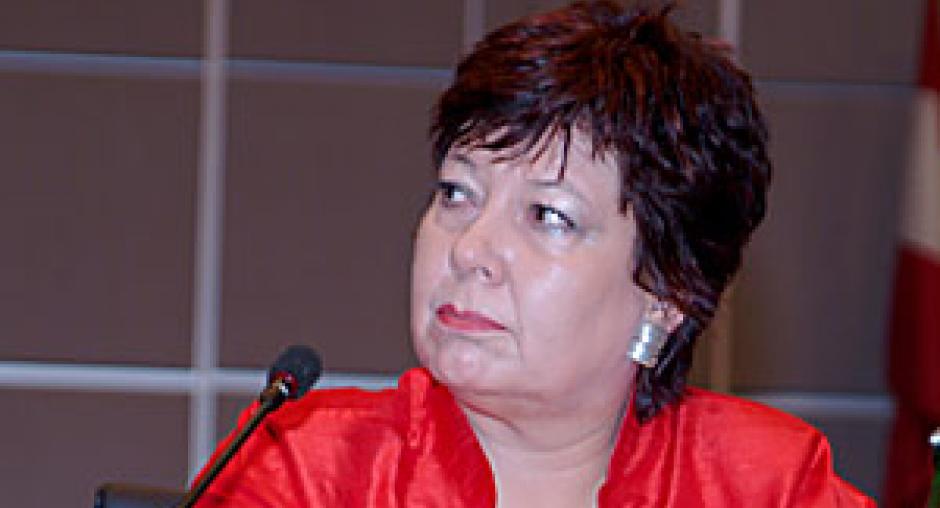Newsroom
OSCE Special Representative calls for creation of an international Alliance Against Trafficking in Persons
VIENNA 23 July 2004

(OSCE/Alexander Nitzsche)Helga Konrad, the OSCE Special Representative on Combating Trafficking in Human Beings, in Vienna, 23 July 2004. (OSCE/Alexander Nitzsche) Photo details
VIENNA, 23 July 2004 - A one-day meeting was held by the OSCE in Vienna today aimed at creating a broad Alliance Against Trafficking in Persons of international, intergovernmental and non-governmental organizations in order to support governments to more efficiently fight this modern scourge.
"We have to pool our forces and resources", said Helga Konrad, the OSCE's new Special Representative on Combating Trafficking in Human Beings, organizer of the event.
"Many good things - ranging from structural and institutional measures and collaborative initiatives to the development of comprehensive action plans at national levels - have been done and continue to be done", she said. "Yet, in spite of all these activities there does not seem to be evidence of a substantial reduction of human trafficking.
"So the question is no longer: 'What can be done about human trafficking?' but rather 'How we can do more and do it better'. There is no time to lose or waste," Ms Konrad urged.
Maud de Boer Buquicchio, Deputy Secretary General of the Council of Europe, called trafficking in human beings "a violation of the most fundamental human rights" and stressed the importance of re-focusing international attention on victim protection.
"So far, international legal co-operation has concentrated on the measures needed to identify and prosecute the criminals, seize their gains, break their networks and eradicate the problem," she said.
"These measures are important, but are they enough? The answer is no. Our social order cannot be effectively protected if we fail to protect and assist the direct victims of trafficking".
Another speaker, Marco Gramegna, Director of the International Organization for Migration's Counter-Trafficking Services, focused on the problem of illegal migration and its links to people smuggling and trafficking.
"If channels for regular migration were opened up, migrants would not have to put themselves in the hand of smugglers and traffickers and would also be in a better position to defend their labour rights in the receiving country," he said.
"To effectively combat trafficking, the whole spectrum from prevention through prosecution and protection needs to be addressed. Strategies that only focus on law enforcement are unlikely to be effective without addressing the requirement for migrant labour, either through legitimate or illegal channels."
The European police umbrella organization, Europol, estimates that more than 3,000 to 4,000 Mafia organizations within the European Union are involved in criminal activities including human trafficking, which has become one of the most lucrative criminal enterprises in the world.
It is estimated that profits from this criminal industry are generating tens of billions of dollars annually to organized crime groups, and that a total 800,000 to 900,000 people are trafficked world-wide each year. More than 30 per cent are children and minors under the age of 18.
"We have to pool our forces and resources", said Helga Konrad, the OSCE's new Special Representative on Combating Trafficking in Human Beings, organizer of the event.
"Many good things - ranging from structural and institutional measures and collaborative initiatives to the development of comprehensive action plans at national levels - have been done and continue to be done", she said. "Yet, in spite of all these activities there does not seem to be evidence of a substantial reduction of human trafficking.
"So the question is no longer: 'What can be done about human trafficking?' but rather 'How we can do more and do it better'. There is no time to lose or waste," Ms Konrad urged.
Maud de Boer Buquicchio, Deputy Secretary General of the Council of Europe, called trafficking in human beings "a violation of the most fundamental human rights" and stressed the importance of re-focusing international attention on victim protection.
"So far, international legal co-operation has concentrated on the measures needed to identify and prosecute the criminals, seize their gains, break their networks and eradicate the problem," she said.
"These measures are important, but are they enough? The answer is no. Our social order cannot be effectively protected if we fail to protect and assist the direct victims of trafficking".
Another speaker, Marco Gramegna, Director of the International Organization for Migration's Counter-Trafficking Services, focused on the problem of illegal migration and its links to people smuggling and trafficking.
"If channels for regular migration were opened up, migrants would not have to put themselves in the hand of smugglers and traffickers and would also be in a better position to defend their labour rights in the receiving country," he said.
"To effectively combat trafficking, the whole spectrum from prevention through prosecution and protection needs to be addressed. Strategies that only focus on law enforcement are unlikely to be effective without addressing the requirement for migrant labour, either through legitimate or illegal channels."
The European police umbrella organization, Europol, estimates that more than 3,000 to 4,000 Mafia organizations within the European Union are involved in criminal activities including human trafficking, which has become one of the most lucrative criminal enterprises in the world.
It is estimated that profits from this criminal industry are generating tens of billions of dollars annually to organized crime groups, and that a total 800,000 to 900,000 people are trafficked world-wide each year. More than 30 per cent are children and minors under the age of 18.
